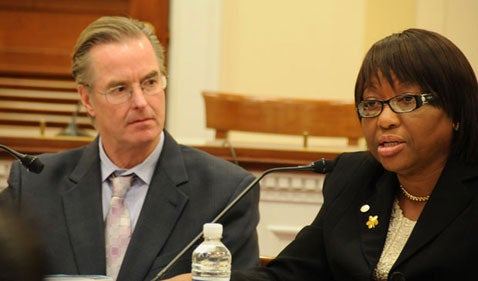

Although the spread of cholera in Haiti has slowed since the epidemic began in 2010, the disease will not be brought under control without major improvements in water and sanitation (WATSAN), public health experts said this week at the U.S. Capitol.
"Not taking action is unacceptable," says PAHO Director

Washington, D.C., 25 October 2013 (PAHO/WHO) — Although the spread of cholera in Haiti has slowed since the epidemic began in 2010, the disease will not be brought under control without major improvements in water and sanitation (WATSAN), public health experts said this week at the U.S. Capitol. They urged the United States and other members of the international community to increase WATSAN investments to eliminate cholera from Haiti and the Dominican Republic and help prevent its spread to more countries of the hemisphere.
"If left unchecked, this deadly but preventable disease could spread once again to the rest of our hemisphere, taking a high human toll and potentially producing an economic catastrophe with its effects on trade, tourism, and investment," said Carissa F. Etienne, director of the Pan American Health Organization (PAHO).
Etienne and other experts spoke at an Oct. 24 briefing in the U.S. Capitol that coincided with the publication of a special section in the American Journal of Tropical Medicine and Hygiene, titled "AJTMH and PAHO: Commemorating the 3rd Anniversary of the Cholera Outbreak in Haiti: Invited Papers," which documents the public health response to the largest national cholera outbreak in modern history.
Since 2010, Haiti's cholera epidemic has sickened some 680,000 Haitians, and more than 8,000 have died. Although the speed of the epidemic has slowed considerably, Haiti's cases accounted for nearly half of all cholera cases reported globally in 2012, and the disease has continued to sicken an average of 1,000 Haitians monthly during 2013.
In addition to Haiti's epidemic, the Dominican Republic has reported over 31,000 cholera cases and 458 deaths since 2010, Cuba has confirmed 678 cases and 3 deaths since July 2012, and Mexico has confirmed 171 cases and 1 death since September of this year.
In the 1990s, a cholera outbreak that began in Peru spread to over 20 countries in the Americas within two years, and it took a decade to bring the epidemic under control.
Haiti—which has the lowest rates of water and sanitation coverage in the Americas—and the Dominican Republic have developed 10-year cholera elimination plans that have as a central objective improving access to water and sanitation. Haiti's action plan calls for $443.7 million in investments for 2013-2015 and $2.2 billion over the next 10 years, while the Dominican Republic's plan calls for $35 million for 2013-2015 and $77 million over 10 years.
"This will require resources," said Etienne. "But not taking action is unacceptable. Too many lives have already been lost, and more lives will be lost if we do not act purposefully and decisively."
{slideshow}214,480,319,n{/slideshow}
Katherine Bliss, co-author of a recent report from the Center for Strategic and International Studies (CSIS) about U.S. support for the cholera response in Haiti, said that Haiti's national plan offers "multiple opportunities" for the United States to enhance its support for water and sanitation improvements and contribute to both cholera elimination and the reduction of other diarrheal diseases. She said failure to support these improvements would threaten the sustainability of other U.S. development investments in the country, in such areas as economic development, women's empowerment, and progress toward democratic governance and participation.
Haiti has already made meaningful progress in water and sanitation, said Rick Gelting, an environmental engineer at the U.S. Centers for Disease Control and Prevention (CDC). He noted that Haiti's National Directorate for Water and Sanitation (DINEPA) has trained and deployed 264 technicians who, together with local rural water committees, are "arguably one of the best rural water and sanitation work forces in the world." The challenge will be to sustain such programs over the long term, Gelting said.
WASH Advocates' representative, Elynn Walter, noted that the United States has provided significant support for water and sanitation in developing countries under the 2005 Water for the Poor Act. She said the proposed new Water for the World Act, introduced in the U.S. Congress earlier this year, would strengthen support in this area, ensuring that water and sanitation remains a political priority, advancing best practices, and leveraging other partnerships and funding.
"We have lost so many people during these three years, and we are still at risk to lose more," said Ralph Ternier, a Haitian physician who works with Partners in Health's sister organization in Haiti, Zanmi Lasante. "But there have been a lot of improvements. The epidemic has taught us a lot—now we know how to treat cholera." He added: "It's important for me to be here with you to let you know that the fight has just started, and we need the support of everybody here."
Partners in Health, WASH Advocates, the CDC, and PAHO are all members of the Regional Coalition for Water and Sanitation to Eliminate Cholera in Hispaniola, which was launched in 2012 by PAHO, CDC, UNICEF, the Spanish Agency for International Development Cooperation (AECID), and the Inter-American Association of Sanitary Engineering and Environmental Sciences (AIDIS). The coalition, which has grown to 20 members, is providing technical cooperation and mobilizing resources for cholera elimination in Haiti and the Dominican Republic.
The Oct. 24 briefing was hosted by Rep. Barbara Lee (Calif.), Rep. Dave Reichert (Wash.), and Rep. Betty McCollum (Minn.) and organized by WASH Advocates. Karen Goraleski, executive director of the American Society of Tropical Medicine and Hygiene, served as moderator.
PAHO, founded in 1902, is the oldest international public health organization in the world. It works with its member countries to improve the health and the quality of life of the people of the Americas. It also serves as the Regional Office for the Americas of WHO.
Links:
- Regional Coalition for Water and Sanitation to Eliminate Cholera in Hispaniola
- American Journal of Tropical Medicine and Hygiene
- Water and Sanitation in the Time of Cholera: Sustaining Progress in Water, Sanitation and Health in Haiti (CSIS report)
- www.paho.org/cholera
Media Contacts:
Leticia Linn, linnl@paho.org, Tel. + 202 974 3440, Mobile +1 202 701 4005, Donna Eberwine-Villagran, eberwind@paho.org, Tel. +1 202 974 3122, Mobile +1 202 316 5469, Sebastián Oliel, oliels@paho.org, Phone +1 202 974 3459, Mobile 202 316 5679, Knowledge Management and Communications, PAHO/WHO—www.paho.org



